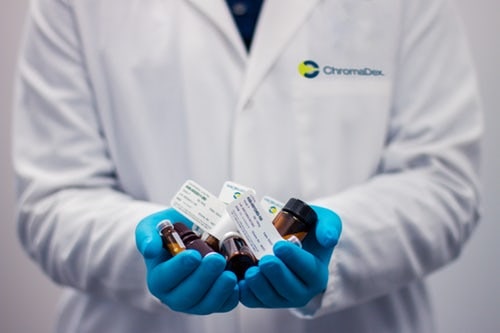Do you regularly feel bloated, have belly pain, constipation and/or diarrhoea, feel anxious, depressed, low in energy and less motivated than you’d like? Any one of these symptoms alone or all together (plus some more if you’re lucky) may be signs you’re experiencing irritable bowel syndrome (IBS).
What Is IBS?

IBS describes a wide variety of unpleasant symptoms (including those above) for which there is no identifiable underlying physical or biochemical explanation1. The diagnosis of IBS is often reached after eliminating other reasons for your symptoms such as coeliac disease or lactose intolerance.
What Can I Do If I Think I Have IBS?

If you’ve been diagnosed with IBS or suspect you may have it and are feeling a little lost with what to do now or have tried a few things, aren’t getting the level of relief you’d like or have been subtly (or not so subtly) told “it’s all in your head” or “there’s nothing really wrong with you” you are far from alone. IBS is fairly common worldwide, most people with IBS symptoms do not consult a doctor and those who do feel standard medical treatment is insufficient2,3. If you’re in this boat and you’re ready to get clear on the treatment options available to you, take your treatment into your own hands and begin to experience changes then this post is for you.
In This Post
First I am going to quickly introduce the three main current treatment options for IBS including very briefly touching on the use of medications to control IBS symptoms and then move on to the pros and cons of the commonly encouraged low FODMAP diet and finish with a lesser known but evidence based treatment option that works with your mind and body in addressing the underlying cause of IBS and which is currently recommended in the National Institute for Health and Care Excellence (NICE) guidelines4– clinical hypnotherapy.
Context: Current Treatment Of IBS

If you’ve sought medical answers and treatment for your IBS symptoms you may be familiar with the feeling of being somewhat of a guinea pig, unclear exactly on what to do and even less clear on what is going to work. Because there is no identifiable physiological reason behind IBS medical treatment is largely concerned with symptom relief. To relieve symptoms any number of medications may be prescribed to you as each medication generally deals with one symptom alone. For example, medications commonly prescribed include those which affect intestinal motility (either to speed up or decrease transit time depending if you’re experiencing constipation or diarrhoea respectively) and antidepressants.
It is common for GPs to give broad recommendations to increase fibre and/or eliminate foods from your diet which may be causing symptoms of intolerance5 more recently interest in the low FODMAP diet as a means of reducing symptoms has grown. Along with drugs and dietary changes clinical hypnotherapy is the other major form of treatment and it has been argued that there is more evidence to support hypnotherapy than any other treatment for severe IBS6,7. Unfortunately clinical hypnotherapy is often only offered in larger gastroenterologist facilities or in areas where clinicians know of clinical hypnotherapists to refer clients to making it less readily available than say an antibiotic or antidepressant prescription even if it is far more useful.
Now let’s take a look at first the low FODMAP Diet and then clinical hypnotherapy in the treatment of IBS in more detail…
What Is A FODMAP Elimination Diet and A Low FODMAP Diet?

The FODMAP elimination diet is a restrictive diet which absolutely requires education and supervision by a dietitian because it is quite an in-depth process with potential harms if not done correctly. A brief summary of the elimination diet is that it involves removing all foods containing FODMAPs from your diet for between 4-8 weeks. Then, if the elimination of FODMAPs results in a symptom reduction or reversal the FODMAPs are reintroduced one by one back into your diet in a controlled dosage while monitoring symptoms. The goal of a FODMAP elimination diet is to identify the particular FODMAPs and the amount that you need to eat before it causes the symptoms.
A low FODMAP diet is an ambiguous term used to describe a diet designed to be deliberately lower than usual in foods containing FODMAPs as an attempt to control IBS symptoms.
What Are FODMAPs?

FODMAP is an acronym which stands for fermentable oligosaccharides, disaccharides, monosaccharides and polyols. Oligosaccharides (fructans, fructo-oligosaccharides and galacto-oligosaccharides), disaccharides (lactose), monosaccharides (fructose) and polyols (sorbitol, mannitol, maltitol, xylitol, polydextrose, and isomalt) are compounds found in a wide variety of foods. To give you an understanding of the diversity of foods which contain FODMAPs the following are some of the higher FODMAP foods for example many vegetables including asparagus, garlic, onions, avocadoes, chickpeas and lentils, dairy products including milk, yoghurt and soft cheeses, many fruits including apples, bananas, cherries and dried fruits and many wholegrains including wheat, rye and barley.
Why Does Cutting Out or Limiting FODMAPs Improve IBS Symptoms for Some People?

FODMAPs are indigestible which means they pass through into your large intestine where they are readily fermented by your healthy gut bacteria resulting in abdominal pain and bloating as well as increased small intestinal water volume and intestinal motility in some people. Therefore, when FODMAPs are removed or decreased in the diet these symptoms of bloating, fluence and diarrhoea are sometimes also reduced.
Of super important note here is that there is a recognition that the level of distress these symptoms cause is heightened for people with a hypersensitive gut-brain connection. What this means is that while two people can have the same physical symptom only one may register it as psychologically upsetting. Similarly, those more affected by stress may experience more severe IBS symptoms. The impact stress has on gastrointestinal function is well known (it disrupts and slows it all down in numerous ways due to a variety of reasons including deactivation of the parasympathetic nervous system and increased stress hormone production) and it is no surprise that chronic stress is often a contributing factor to IBS flare ups. What this means is that people often find that even when they are eating the perfect low FODMAP diet their IBS symptoms don’t ever fully go away or they reoccur in times of stress because for the majority of people it is safe to say lifestyle and psychological factors are contributing to IBS symptoms8,9.
Why Wouldn’t You Just Go on a Low FODMAP Diet and Problem Solved…?

While a few studies have shown a reduction in a number of IBS symptoms when people follow a low FODMAP diet low FODMAP diets are associated with some potentially unfavourable implications. Including changes in the microbiota (bacterial composition of the digestive tract) perhaps due to decreased intake of a number of probiotics (fructans and galacto-oligosaccharides)10,11 known to be good for gut health and changes in the metabolome (the production and amount of substances necessary for a healthy metabolism) as well as the chance for negative nutritional consequences12 due to the severely restrictive requirements of the diet. Because any form of low FODMAP diet is relatively new the long-term implications of these changes are unknown.
So, Are FODMAPs Good or Bad?

There is nothing inherently bad about FODMAPs in and of themselves. It is only the reactions of some people to these food components which has sparked interest in the idea of a low FODMAP diet and projects to profile foods high in FODMAPs. If you do not have IBS or if you do have IBS and you can treat it by other means, please do so because as well as the potential negative implications given above including FODMAPs in your diet has important positive health effects including helping keep you regular (i.e helping you poop), enhancing calcium absorption (maintaining healthy teeth, bones, heart and muscle function), helping with immune function (keeping you healthy this winter) and reducing blood cholesterol levels (protecting against cardiovascular disease). FODMAPs also selectively promote growth of beneficial bacteria including bifidobacterial (the ones you get in prebiotics and yoghurt)13,14.
Interestingly it is the fermentation of the FODMAPs by the cells of the large intestine (colonocytes) which produces unpleasant symptoms in some people which is also the very thing which produces short-chain fatty acids (SCFAs) and SCFAs help the cells of your large intestine to grow and proliferate and protect against colon cancer15,16 (the most common form of cancer in the world) a pretty great thing.
All of the above positive effects are obviously compromised with a low-FODMAP diet and there’s higher risk of potentially negative implications both physically and mentally due to increased stress, anxiety and reduced quality of life from restrictions such a diet can place on social interactions. Hence why I wouldn’t promote this diet as the first or only choice to manage IBS symptoms, not when there are far better options available.
What Should I Do When I’ve Tried Medications and Diet Changes and I Still Have Symptoms?

Clinical hypnotherapy.
Ideally, I would encourage clinical hypnotherapy alongside dietary change (and here I am talking dietary change with the help of a dietitian). Why? Because clinical hypnotherapy works to find a cure and develop the skills to make lifestyle changes that will support your health for life rather than short-term symptom suppression or reduction and unlike restrictive dietary changes and drugs has no negative side effects. Dietary changes might very well help but rarely are they going to be the be all and end all necessary to free you from the painful IBS symptoms.
What Is Clinical Hypnotherapy?

In a short and sweet sentence to sum up a large topic clinical hypnotherapy is a tool which helps people control unwanted behaviour, emotions or biological processes17.
The process of clinical hypnosis and what happens at a physical level is not too hard to describe- a hypnotherapist induces a hypnotic state (a natural stage of focused attention)18 which leads to altered brain activity and structure involved in consciousness7,19-23. fMRIs and EEGs show this as increases in theta wave activity which are the brainwaves associated with attention and memorisation indicating that hypnosis changes how our brains pay attention to things allowing us to give focused attention and become more open to suggestion and change in such a way that would not be possible from a fully conscious state of awareness (even if we are receiving much the same information). However, it is what this means in terms of health and the quality of your life which is far harder to capture in words and where the true value of hypnotherapy is realised.
What Is the Evidence for Hypnotherapy in IBS Treatment?

There are several well-designed studies looking at the use of hypnotherapy in the treatment of IBS, including randomized controlled trials (RCTS are the gold standards of the science world) which demonstrate significant immediate and long-term improvement of both physical and mental symptoms including improvements in anxiety, depression, quality of life as well as decreased health-care expenses6,7,24-28. In fact, in a number of studies hypnotherapy has been found to be superior to the available pharmacological treatment options, placebo and nontreatment29-32.
The exact mechanisms by which clinical hypnotherapy brings about the desired changes are unknown however, there are studies showing the effects it has ranging from impacting immunology33, improving gut motility34 and autonomic nervous system activity7, reducing gut hypersensitivity35.
Ultimately clinical hypnotherapy used for treatment of IBS helps people learn to influence and gain control over their own gut functions18,28 and experience pain relief as well as and perhaps most important of all gain emotional regulation because the majority of people with IBS experience problems relating to emotional dysregulation including anxiety and depression26. Control over emotions therefore is crucial to improving the gut-brain communication in IBS27 and in my mind the best outcome of any health treatment is to give the person increased control over themselves and their health and the number one therapy choice for improving self-efficacy and competence is hypnotherapy.
How Many Hypnotherapy Sessions Are Recommended for Treatment of IBS?

Typically, in the treatment of IBS you will receive up to 12 one-on-one sessions (each lasting 45–60 minutes) once a week over a course of 12 weeks. I offer an 8 week IBS “package” where we work together over in 8 one-on-one sessions (each 60-90minutes) over 8 weeks. I find in practice it is common for IBS symptoms to be largely resolved within the first 3 however because IBS is far more complicated than simply “bloating” (as you will know if you experience it) which means after you gain freedom from the symptoms there is often far more skills to develop and changes to make. The goal is always to get free of the problem first and then look at going further especially with regards to more education and knowledge acquisition. While with hypnotherapy these overlap comfort is the primary goal initially and we reach this as soon as possible.
This may initially sound like a time intensive treatment option but those who’ve suffered with the symptoms and invested time, energy and money into what can feel like a fruitless search for an intangible cure know 9-12 hours invested into a structured and scientifically supported option is an investment worth making. IBS is generally treated as a chronic problem and one which you will be managing for the rest of your life which means a 9-12 hour investment is incomparable to the alternative pessimistic forecast… There are some other reasons why I encourage clinical hypnotherapy and they are that if you choose to work with a competent professional clinical hypnotherapist you will get far more out of it than simply a reduction or cure of your IBS symptoms.
Extra Benefits of Hypnotherapy (aka Where the Real Magic Lives)

The greatest thing about seeking clinical hypnotherapy as part of your IBS treatment is it has the potential to help you build skills outside of the specific IBS ones you want relief from now. Hypnotherapy has been shown to help people gain more energy, overcome depression and anxiety and gain confidence, purpose, fulfilment, direction and clarity over their lives and quite literally become the person they want to be. Clearly all things no amount of laxative, antispasmodic, antidepressant medications or dietary restrictions can give you and all things no scientific study can capture the magnitude and meaning of.
Take Home Messages

There is no universal approach to treatment of IBS which is going to work for everyone, and this is why I encourage you to continue to seek treatment until you find what does work for you. IBS is a complex problem with both physical and psychological components therefore it’s likely a that combination of treatment modalities will give you the best outcome. In the words of Hippocrates ‘the father of modern medicine’.

“It is more important to know what sort of person has a disease than to know what sort of disease a person has”
~ Hippocrates
At the end of the day the more drugs you take to relieve symptoms the more risk your putting yourself at to develop further complications and while a low FODMAP diet may be useful for some people and in reducing some symptoms, it is rarely the IBS cure all. In any case medications and/or a low FODMAP diet should always be paired with treatment options which expand your ability, self-efficacy and choices and clinical hypnotherapy is one such evidence-based treatment option which has been shown to be clinically effective for the treatment of IBS.
Finally, hypnosis is simply a tool for change (it’s not actually magic) and as a tool it is what happens in its use which makes all the difference. This means you must work with a licensed and skilled professional clinical hypnotherapy practitioner preferably also trained in human physiology and nutrition in order to have the highest chance at experience the highest results for you.
If you are interested in finding out more about clinical hypnotherapy and how it may be able to help you gain freedom from the life limiting symptoms of IBS (and potentially go much further) please give me a call (+61)435 379 953 or email [email protected] and I can answer any of your questions and discuss options with you. As I said I run 8 week one-on-one IBS clinical hypnotherapy-dietetic sessions and hypnotherapy for the treatment of IBS and other clinical health problems with mental and physical overlaps are my field of speciality. There’s not many things I enjoy more than facilitating others to overcome illnesses that were supposed to be “chronic.
With my whole heart I trust you found this information useful and inspiring

Become Great. Live Great.
Bonnie.
Reference
- Drossman DA (Ed). Diagnostic Criteria for the Functional Gastrointestinal Disorders. Second edition. Kansas: Degnon Associates. 2000;659-69.
- Thompson WG et al. Irritable bowel syndrome: The view from general practice. Eur J Gastroenterol Hepatol. 1996;9:689–692
- Whitehead WE et al. Usual medical care for irritable bowel syndrome. Aliment Pharmacol Ther. 2004: 20;1305–1315.
- National Institute for Health and Care Excellence (NICE). Irritable bowel syndrome in adults: diagnosis and management of irritable bowel syndrome in primary care 2015. Available from: https://www.nice.org.uk/guidance/cg61 (accessed May 2019).
- Jones J, Boorman J, Cann P, Forbes A, Gomborone J, Heaton K, et al. British Society of Gastroenterology guidelines for the management of the irritable bowel syndrome. 2000. Available online: www.bsg.org.uk/ pdf_word_docs/man_ibd.pdf.
- Palsson OS and Whitehead WE. The growing case for hypnosis as adjunctive therapy for functional gastrointestinal disorders. Gastroenterology. 2002;123:2132–2135.
- Palsson OS, Turner MJ, Johnson DA, Burnett CK, Whitehead WE. Hypnosis treatment for severe irritable bowel syndrome: investigation of mechanism and effects on symptoms. Dig Dis Sci. 2002;47 (11):2605–14.
- Longstreth GF, Thompson WG, Chey WD, Houghton LA, Mearin F, Spiller R. Functional bowel disorders. Gastroenterology. 2006;130:1480-91.
- Herschbach P, Henrich G, von Rad M. Psychological factors in functional gastrointestinal disorders: characteristics of the disorder or of the illness behavior? Psychosom Med. 1999;61:148-53.
- Staudacher HM, Lomer MC, Anderson JL, et al. Fermentable carbohydrate restriction reduces luminal bifidobacteria and gastrointestinal symptoms in patients with irritable bowel syndrome. J Nutr. 2012;142:1510–8.
- Böhn L, Störsrud S, Liljebo T, et al. Diet low in FODMAPs reduces symptoms of irritable bowel syndrome as well as traditional dietary advice: a randomized controlled trial. Gastroenterology. 2015;149:1399–407.
- Catassi G, Lionetti E, Gatti S and Catassi C. The Low FODMAP Diet: Many Question Marks for a Catchy Acronym. Nutrients. 2017;9:292.
- Staudacher HM, Irving PM, Lomer MC, Whelan K. Mechanisms and efficacy of dietary FODMAP restriction in IBS. Nat. Rev. Gastroenterol. Hepatol. 2014;11:256–266.
- Sabater-Molina M, Larqué E, Torrella F, Zamora S. Dietary fructooligosaccharides and potential benefits on health. J. Physiol. Biochem. 2009;65:315–328.
- Andoh A, Tsujikawa T, Fujiyama Y. Role of dietary fiber and short-chain fatty acids in the colon. Curr. Pharm. Des. 2003;9:347–358.
- Blachier F, Beaumont M, Andriamihaja M, Davila AM, Lan A, Grauso M, Armand L, Benamouzig R, Tomé D. Changes in the Luminal Environment of the Colonic Epithelial Cells and Physiopathological Consequences. Am. J. Pathol. 2017;187:476–486.
- Barnett H. The Which? Guide to Complementary Therapies. London: Which? Ltd, 2002.
- Gonsalkorale WM, Whorwell PJ. Hypnotherapy in the treatment of irritable bowel syndrome. Eur J Gastroenterol Hepatol. 2005;17:15-20.
- Rainville P et al. Hypnosis modulates activity in brain structures involved in the regulation of consciousness. J Cogn Neurosci. 2002;14:887-901
- Vlieger AM, Rutten JM, Govers AM, Frankenhuis C, Benninga MA. Long-term follow-up of gut-directed hypnotherapy vs. standard care in children with functional abdominal pain or irritable bowel syndrome. Am J Gastroenterol. 2012;107(4):627–31.
- Gonsalkorale WM, Toner BB, Whorwell PJ. Cognitive change in patients undergoing hypnotherapy for irritable bowel syndrome. J Psychosom Res. 2004; 56(3):271–8.
- Lowe´n MB, Mayer EA, Sjo¨berg M, Tillisch K, Naliboff B, Labus J, et al. Effect of hypnotherapy and educational intervention on brain response to visceral stimulus in the irritable bowel syndrome. Aliment Pharmacol Ther. 2013; 37(12):1184–97.
- Miller V. et al. Hypnotherapy for irritable bowel syndrome: an audit of 1000 patients. Gastroenterology 142 (Suppl. 1), S-296 (2012).
- Lindfors P. et al. Effects of gut-directed hypnotherapy on IBS in different clinical settings—results from two randomized, controlled trials. Am. J. Gastroenterol. 107, 276–285 (2012).
- Whitehead WE, Palsson O, Jones KR. Systematic review of the comorbidity of irritable bowel syndrome with other disorders: what are the causes and implications? Gastroenterology. 2002; 122(4):1140–56.
- Mayer EA, Savidge T, Shulman RJ. Brain–gut microbiome interactions and functional bowel disorders. Gastroenterology. 2014; 146(6):1500–12.
- Peter J, Tran US, Michalski M, Moser G (2018) The structure of resilience in irritable bowel syndrome and its improvement through hypnotherapy: Cross-sectional and prospective longitudinal data. PLoS ONE 13(11): e0202538.
- Whorwell PJ, Prior A, Faragher EB. Controlled trial of hypnotherapy in the treatment of severe refractory irritable bowel syndrome. Lancet 1984;ii:1232–4.
- Houghton LA, Heyman DJ, Whorwell PJ. Symptomatology, quality of life and economic features of irritable bowel syndrome—the effect of hypnotherapy. Aliment Pharmacol Ther 1996;10:91–5.
- Galovski TE, Blanchard EB. The treatment of irritable bowel syndrome with hypnotherapy. Appl Psychophysiol Biofeedback 1998;23:219–32.
- Perjohan Lindfors , MD 1 – 3 , Peter Unge , MD, PhD 4,5 , Patrik Arvidsson , PhD 2 , Henry Nyhlin, Einar Bj ö rnsson, Hasse Abrahamsson and Magnus Simr é n Effects of Gut-Directed Hypnotherapy on IBS in Different Clinical Settings — Results From Two Randomized, Controlled Trials. Am J Gastroenterol 2012; 107:276–285.
- Mawdsley JE, Jenkins DG, Macey MG, Langmead L, Rampton DS. The effect of hypnosis on systemic and rectal mucosal measures of inflammation in ulcerative colitis. Am J Gastroenterol. 2008; 103 (6):1460–9.
- Whorwell PJ. Hypnotherapy for irritable bowel syndrome: the response of colonic and noncolonic symptoms. J Psychosom Res. 2008; 64(6):621–3.
- Lea R, Houghton L, Calvert E, Larder S, Gonsalkorale W, Whelan V, et al. Gut-focused hypnotherapy normalizes disordered rectal sensitivity in patients with irritable bowel syndrome. Aliment Pharmacol Ther. 2003; 17(5):635–42.



